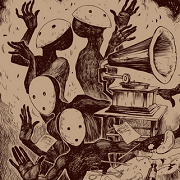(Thread IKs:
skooma512)
|
the best part about all of this is there are no other search engines besides google and bing. if theres a search engine that you think is run by someone else? guess what, its just modified bing or google results
|
|
|
|

|
| # ? May 25, 2024 00:48 |
|
i am harry posted:well, today I’m making gumbo but I didn’t have a bell pepper or any green onions, so I walked to the grocery store and got one of each. the bell pepper was $1.50 and the onions were $0.89, and between me and the cash registers was the door, so I just walked out and walked home. Limes were $.25/each last year Last week they were $.55/each lol Sunday I paid $.65/each lmao
|
|
|
|
gradenko_2000 posted:Imgur gonna die bought PIKAL, bought How to Grow Edible and Medicinal Mushrooms think I’m god I mean good
|
|
|
|
spacemang_spliff posted:I paid there’s your problem
|
|
|
|
spacemang_spliff posted:Limes were $.25/each last year please think of the shareholder value you create
|
|
|
|
anime was right posted:the best part about all of this is there are no other search engines besides google and bing. if theres a search engine that you think is run by someone else? guess what, its just modified bing or google results Yandex
|
|
|
|
Eggs were $2.50 today. looks like Biden saved the economy again. Like a boss.
|
|
|
|
https://twitter.com/StatusCoup/status/1656320395094421505?t=h5Dp1tMnYCKIlI2KxGemxg&s=19
|
|
|
|
Spaced God posted:Americans are the most docile, cucked herd animals on earth so we will gladly fight to the death over the slop as those in power cash in and enjoy the remaining days in paramilitary guarded luxury Every (American) liberal believes that because they also had Locke drilled into them, so the comparison to people who are worse off seems to be the only way to organize society, and airtight explanation of How Things Are. but the bottom line is that he, Hobbes, Rousseau and company didn’t describe material reality in their ramblings about property rights and liberty. The assurance in these beliefs is going to buckle under American material conditions declining. Americans were docile herd animals when they could be self sufficient yeoman farmers, or when the frontiers were open, or when they had material prosperity despite working for wages. Take away these things, that social order - and remember liberalism itself denies there is one, there are no social relations, only transactions - completely falls apart.
|
|
|
|
I guess it's time to learn Chinese & Russian to get the good search results
|
|
|
|
Jon Pod Van Damm posted:I guess it's time to learn Chinese & Russian to get the good search results 
|
|
|
|
Mr Hootington posted:https://twitter.com/StatusCoup/status/1656320395094421505?t=h5Dp1tMnYCKIlI2KxGemxg&s=19 Booorrrriiiinnnnnngggggg. That derailment happened 500 news cycles ago.
|
|
|
|
https://twitter.com/BigApeHates12/status/1656432637186301952?t=jLvDDjffDBtWz7nmoOyfvQ&s=19 Hahahahaha good thing Google is gonna be around forever!
|
|
|
|
Mr Hootington posted:https://twitter.com/StatusCoup/status/1656320395094421505?t=h5Dp1tMnYCKIlI2KxGemxg&s=19 I'm pretty sure the answer is in Poland cuz that's where Joe Biden went when this happened.
|
|
|
|
spacemang_spliff posted:Limes were $.25/each last year If you are tired of inflation, simply stop buying products that have gone up in price.
|
|
|
|
Anyway, as far as de-dollarization goes, I think everyone knows that it is going to be a slow/gradual process and that the USD isn't going to actually completely combust out of nowhere. It is less the US is going to go bankrupt or dollars will become toilet paper over night but as more and more nations refuse to sponge every increasing amount of debt being produced, it is going to force the hand of the US in a lot of ways, likely higher than average interest rates on time, which will likely also mean higher yields on bonds and therefore more interest that needs to be paid, and possibly devaluation. IT is an issue that will continue to go on for years regardless if there is a banking crisis or not.
|
|
|
|
spacemang_spliff posted:Limes were $.25/each last year Limes are controlled by the cartels iirc The prices are also seasonal and go up and down like crazy every year even before the cartel manipulation
|
|
|
|
gradenko_2000 posted:https://twitter.com/flglmn/status/1656401212374228993 This is just a New Coke false flag campaign to cover for an even shittier, more ad infested search engine algorithm to be introduced as Google Classic once this is predictably hated.
|
|
|
|
Father Wendigo posted:This is just a New Coke false flag campaign to cover for an even shittier, more ad infested search engine algorithm to be introduced as Google Classic once this is predictably hated. this is a likely scenario but it will probably be by pure accident
|
|
|
i am harry posted:"things are relatively okay" Let's turn student loans back on. That'll help the economy. Although they may want to exactly that because it's deflationary. Immiserating the middle class at best and leaving the all the new billionaires intact, which are definitely not inflating the currency in anyway.
|
|
|
|
anime was right posted:this is a likely scenario but it will probably be by pure accident It's Google. They'll put it in beta, leave it that way for 3 years, and then shut it down.
|
|
|
|
|
anything happen today?
|
|
|
RadiRoot posted:anything happen today? CPI came in at expectations and the market poo poo itself then went "No, everything's fine, here's why 1/47" Google announced their intention to destroy their business Debt ceiling doomsday creeps from 1% to 2%
|
|
|
|
|
Mustached Demon posted:I know how we can get better billionaires is this deflationary
|
|
|
|
doomsday economics?!? no, DOOM loop economics!!quote:n the spring of 2019, Marc Benioff surveyed his kingdom and it looked good. He stood on the top floor of the Salesforce Tower, the tallest building in San Francisco, named after his company, then the largest employer in San Francisco. You could see every part of the city and out across the bay. The UCSF Benioff Children’s Hospital and the Benioff Children’s Hospital in Oakland (to which Benioff had donated $250 million). The site of a 200-bed Navigation Center for the homeless (which Benioff had defended in the face of other rich — but less rich — San Franciscans who tried to fight it off). The city looked sun-kissed and thriving from this view: the elegant Golden Gate Bridge, Twin Peaks, the surreal green of the Marin Headlands. Xaris has issued a correction as of 05:06 on May 11, 2023 |
|
|
HAIL eSATA-n posted:is this deflationary Taxing or otherwise impeding the people with literally 80% of the wealth of this country, would not be helpful for inflation and is an option that is anathema.
|
|
|
|
|
SKULL.GIF posted:CPI came in at expectations and the market poo poo itself then went "No, everything's fine, here's why 1/47" what project thing did google kill now? all i can look up is boring poo poo about AI. i guess machine learning is no longer a thing. RadiRoot has issued a correction as of 05:03 on May 11, 2023 |
|
|
|
SKULL.GIF posted:People are hedging against the debt ceiling implosion. They believe it to be 3x more likely to happen than in 2011. Thanks for explaining. I now realize that "CDS" is short for "credit default swap."
|
|
|
|
Cpt_Obvious posted:Weird how all the idiots stfu when the banks were melting down. not me i was hollering
|
|
|
|
Paradoxish posted:I mean, I keep looking at that screenshot and I'm legitimately coming around to the take that this can kill Google. That's really bad, to the point that it's going to make Google useless. And I don't mean useless as in "this is bad lol" but as in there is going to be no use case for anyone to rely on Google search results anymore; you might as well just put your search directly into Amazon. They're actually going to destroy their ad business by undermining their own platform.
|
|
|
|
anime was right posted:the best part about all of this is there are no other search engines besides google and bing. if theres a search engine that you think is run by someone else? guess what, its just modified bing or google results Kagi. It's actually good but it keeps getting more expensive. I got my boss to pay for a year when it was $5/month but now it's gone up a couple times and it has turned into 25/mo for unlimited searches which is ridiculous.
|
|
|
|
taqueso posted:Kagi. It's actually good but it keeps getting more expensive. I got my boss to pay for a year when it was $5/month but now it's gone up a couple times and it has turned into 25/mo for unlimited searches which is ridiculous. if the internet was actually founded upon monetary transactions for services instead of FREE!* that became the norm it would still suck but for different reasons than it does today. now you can also extrapolate that to the real* world, and.. well.... communism now pls Xaris has issued a correction as of 05:51 on May 11, 2023 |
|
|
|
I was reading and stumbled on this: “There is a much greater probability that communism will gain its victories in the agrarian orient than in the industrial occident. In the west even agrarian Spain shows signs of stabilizing its revolution upon the semi-bourgeois, semi-socialistic pattern, which Germany has made familiar. The world may become divided between a communistic orient and a semi-socialistic occident, moving slowly toward the socialistic goal, but always running the danger of moving too slowly to avert another catastrophe.”
|
|
|
|
Source ?
|
|
|
|
Sounds like they should go on strike
|
|
|
|
"we’re like, ‘Ah, hahahaha, this is SF.'"
|
|
|
|
lets see how america is doing...quote:The line outside Boston’s American Red Cross Food Pantry on a recent Saturday morning stretched the length of two football fields. oh... well, soft landing y'all. too much excess savings
|
|
|
|
Xaris posted:lets see how america is doing... Part of equality is being equal to the rest of the world and that includes the starvation & misery part.
|
|
|
|
I think Google with ai will be a success based on all the most popular websites being artfully awful. It's what people want.
|
|
|
|

|
| # ? May 25, 2024 00:48 |
|
Xaris posted:lets see how america is doing... Combo of inflation and losing SNAP benefits is crazy. Going to see some real fallout from that.
|
|
|




















































